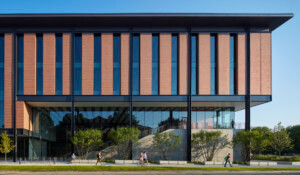The members of Chicago‘s Building Owners and Managers Association (BOMA) control nearly 80 percent of downtown Chicago’s rentable building area. That makes them critical to local energy efficiency initiatives that aim to reduce the nearly 40 percent of U.S. energy that is consumed by buildings.
At a trade show Wednesday entitled “Building Chicago: Greening the Heartland,” BOMA officials reported on progress from their smart grid initiative first announced in 2012. The plan, now wrapping up its test phase, would share energy data among BOMA members for the purpose of cutting energy use in many large buildings.
BOMA initially fought—and still opposes—the city’s energy benchmarking and disclosure ordinance that requires non-industrial buildings larger than 50,000 square feet to report their energy usage publicly.
A BOMA spokeswoman said after the event that the group only opposes mandatory public disclosure of energy data, not its collection.
Using smart meters from Chicago-based Automated Logic, BOMA has completed pilot testing on several downtown buildings. The “smart grid” refers to a responsive system for distributing and using electricity (and eventually other resources like gas and water) wherein utilities and consumers automatically share data that can be used to reduce the overall demand for power.
Meters designed for BOMA measure energy data second-by-second and can be reviewed in real time, said Mike Munson of smart grid technology firm Metropolitan Energy, as opposed to typical meters from ComEd that usually measure at 30 minute intervals and whose reports can only be viewed monthly. For the owners and managers of buildings over one million square feet, utility bills can top $800,000 per year—often among the owner’s highest expenses along with labor costs and property taxes. Still, said BOMA’s T.J. Brookover, they are accepted as a fixed cost.
“Very few times are we dissecting those bills, looking at them, and understanding how we’re using energy,” said Brookover.
BOMA is trying to encourage more of its members to sign up for the program, but officials admitted it “has been slow” to bring skeptical building owners and managers on board. Under the terms of the plan, they said, individual buildings only see their own data, but only BOMA sees all of it.
“The city hopes to shame owners into investing in energy efficiency,” Brookover said of Chicago’s benchmarking ordinance. On the contrary, he said, BOMA’s plan emphasizes cost savings. Whether you pursue energy efficiency because you hope to slash hefty bills or limit the rising tide of climate change-causing greenhouse gas emissions, said BOMA Executive Vice President Michael Cornicelli, smart grid technology has a role to play.
“We can all get what we want from a well-designed smart grid infrastructure and strategy,” he said.










